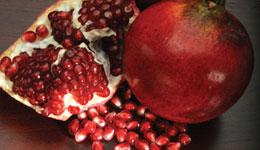Pomegranate

Pomegranates might prove fruitful for breast cancer suppression
The crimson pomegranate has long held a reputation for suppressing growth and life. In Greek mythology, Persephone’s consumption of a few of its arils led to her banishment to the underworld and the cold infertility of winter.
Now modern-day researchers at City of Hope may have found a different seed of suppression: The fruit appears to stop and prevent certain breast cancers from growing.
In a study published in Cancer Prevention Research, Shiuan Chen, Ph.D., chair and professor, Department of Cancer Biology, research fellow Lynn Adams, Ph.D., and their colleagues found that pomegranates contain six compounds that may prevent breast cancer growth by blocking aromatase, an enzyme known to play a key role in most breast cancers. Aromatase converts androgens to estrogens, and most breast cancers depend on estrogen to grow.
Of these six substances, one called urolithin B (UB) has the most powerful impact, inhibiting several estrogen-producing mechanisms that fuel breast cancer’s growth. Chen and his team found that UB prevented the proliferation of estrogen-responsive breast cancer cells in the lab.
“By suppressing the production of estrogen, urolithin B and other phytochemicals found in pomegranates can prevent hormone-responsive breast cancer tumors from growing,” said Chen. Phytochemicals are naturally occurring plant compounds that may benefit health.
The other phytochemicals in pomegranates found to inhibit aromatase activity are urolithin A (UA), methylated UA, acetylated UB, methylated UB and UB sulfate.
Previous research has shown that pomegranate juice is rich in active antioxidants and its compounds may slow growth of human breast and prostate cancer cells.
“The results of this study suggest that pomegranate intake may be a viable strategy for preventing breast cancer,” said Chen.
Study authors included Yanjung Zhang, Ph.D., Navindra Seeram, Ph.D., and David Heber, M.D., Ph.D., from the David Geffen School of Medicine’s Center for Human Nutrition at the University of California, Los Angeles.
Now modern-day researchers at City of Hope may have found a different seed of suppression: The fruit appears to stop and prevent certain breast cancers from growing.
In a study published in Cancer Prevention Research, Shiuan Chen, Ph.D., chair and professor, Department of Cancer Biology, research fellow Lynn Adams, Ph.D., and their colleagues found that pomegranates contain six compounds that may prevent breast cancer growth by blocking aromatase, an enzyme known to play a key role in most breast cancers. Aromatase converts androgens to estrogens, and most breast cancers depend on estrogen to grow.
Of these six substances, one called urolithin B (UB) has the most powerful impact, inhibiting several estrogen-producing mechanisms that fuel breast cancer’s growth. Chen and his team found that UB prevented the proliferation of estrogen-responsive breast cancer cells in the lab.
“By suppressing the production of estrogen, urolithin B and other phytochemicals found in pomegranates can prevent hormone-responsive breast cancer tumors from growing,” said Chen. Phytochemicals are naturally occurring plant compounds that may benefit health.
The other phytochemicals in pomegranates found to inhibit aromatase activity are urolithin A (UA), methylated UA, acetylated UB, methylated UB and UB sulfate.
Previous research has shown that pomegranate juice is rich in active antioxidants and its compounds may slow growth of human breast and prostate cancer cells.
“The results of this study suggest that pomegranate intake may be a viable strategy for preventing breast cancer,” said Chen.
Study authors included Yanjung Zhang, Ph.D., Navindra Seeram, Ph.D., and David Heber, M.D., Ph.D., from the David Geffen School of Medicine’s Center for Human Nutrition at the University of California, Los Angeles.